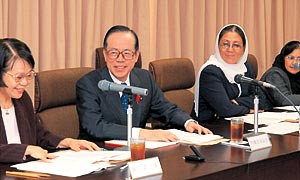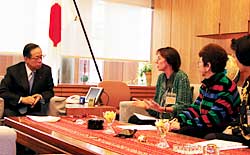![]()
Assistance to Women in Afghanistan
 Habiba Sarabi, Afghan Minister of Women's Affairs and Chief Cabinet Secretary Fukuda, Minister for Gender Equality, attending the Advisory Council on Assistance to Women in Afghanistan [Photo: Cabinet Public Relations Office] |
At the "International Conference on Reconstruction Assistance for Afghanistan" held in Japan in January 2002, Japanese Prime Minister Junichiro Koizumi raised "the empowerment of women" as a key priority area for Japan in its assistance to Afghanistan.The Co-Chairs' Summary of Conclusions also stated "the centrality of restoring the rights and addressing the needs of women, who have been the prime victims of conflict and oppression. Women's rights and gender issues should be fully reflected in the reconstruction process". Given these circumstances, since February 2002, an "Advisory Council on Assistance to Women in Afghanistan" (Chaired by Professor Hiroko Hara, University of the Air) is held as an informal meeting with Yasuo Fukuda, Chief Cabinet Secretary and Minister for Gender Equality to discuss and propose the way to assist reconstruction of Afghanistan with consideration of women's needs. Resulting proposal entitled "Japanese Assistance to Women in Afghanistan" was submitted to the Chief Cabinet Secretary on May 31, 2002.
This proposal states the importance of considering the needs of women in Afghanistan and appling women/gender perspectives in all areas of Japanese assistance. From women's/gender perspectives, the proposal lists the "Basic concept", "Strategies" and "Description of Possible Projects for Assistance" in six supporting areas and "Measures Necessary in Japan, for Monitoring and Evaluation Programs from Gender Perspective " . The six supporting areas are "Political and Industrial Framework", "Education", "Health", "Business and Livelihood", "Basic Infrastructure" and "Peace and Safety/Security".
Taking this opportunity , the Cabinet Office held a "Meeting on Assistance to Women in Afghanistan" in July 2002, to make the content of the proposal widely known to the public.
Furthermore, Ms.Habiba Sarabi, Afghan Minister of Women's Affairs, visited Japan from the end of September through early October 2002 at the invitation of the Chief Cabinet Secretary. In addition to paying a courtesy call on the Chief Cabinet Secretary, the Minister engaged in opinion exchange with the Advisory Council and visited a women's facility.
The Cabinet Office will conduct necessary follow-up on the assistance for women in Afghanistan, taking the situation prevailing in Afghanistan into consideration.
Policy Dialogue on Gender Equality 2002
The Cabinet Office held an international symposium "Policy Dialogue on Gender Equality 2002" for promoting the formation of a gender equal society from a global perspective with following the outcome of UN special session of the General Assembly, Women 2000, which was held in June 2000.
Three foreign experts, Dr. Nancy Jane Hafkin, Ms. Margaret Gallagher, and Prof. Kio Chung Kim, were invited and participated in the symposiums held in Tokyo and Akita.
Tokyo Conference
Approximately 180 participants attended the Tokyo Conference held at the JICA Institute for International Cooperation in Ichigaya.
The conference began with a keynote lecture entitled Measures to promote Gender Equality in Europe, which presented measures and the details of steps taken by the European Union and the Council of Europe. This was followed by panel discussions on three themes and an overall discussion. In the first panel discussion, "elimination of violence against women", indicated that improvement of the status of women was identified as being indispensable to any fundamental solution for violence against women. The second panel, "ICT and Advancement/Empowerment of women", emphasized the point that ICT comprised the most effective means of women's capacity building and reducing social and financial gaps. The third panel, "Participation and Access to the Media", pointed out that women's participation in the media remained low at the decision-making level and positive action was necessary. In the overall discussion, which covered these three themes, panelists and participants had a discussion based on the questions from the floor.
|
Akita Conference Approximately 320 participants attended the Akita Conference, which was held at the Akita Culture Hall. Starting with keynote lectures by foreign panelists, the meeting then divide into three units entitled "Elimination of Violence against Women", "Women in the Media", and "ICT and Women", where participants engaged in discussion on the respective themes. |
 Chief Cabinet Secretary Fukuda, Minister for Gender Equality, exchanging opinions with gender experts |
